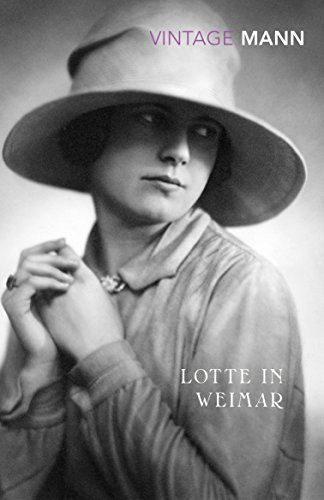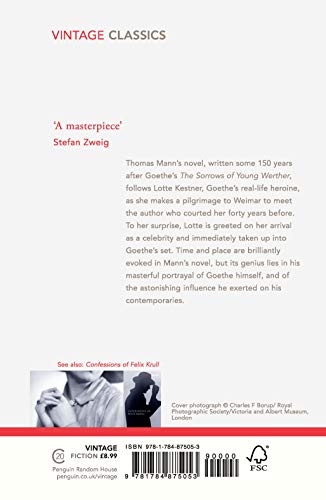Customer Services
Copyright © 2025 Desertcart Holdings Limited
Desert Online General Trading LLC
Dubai, United Arab Emirates



Lotte In Weimar
C**R
Hugely enjoyable
I found this a good read for during lockdown. It deals with a trip of the eponymous Lotte, Goethe’s erstwhile muse, to see her family in Weimar in the hope of getting to see the great man again in his residence nearby, decades after their previous meeting, during which time both have been widowed. It is full of meditations on the nature of the artistic endeavour and the life sacrifices made by a literary giant and their family. It gives insights into Goethe’s life and times, but has obvious relevance to the situation of Thomas Mann himself as the major figure in 20th century German literature. I found the last chapter where Goethe secretly meets Lotte alone in his carriage returning from the theatre, frankly discussing their experiences of life , quite moving in the usual melancholy Mann way. I would advise against reading this as ones first Thomas Mann novel, The Magic Mountain or Buddenbrooks being more accessible, but it has to be on the list of ones to read for Mann enthusiasts.
J**N
good
good
A**9
Mann on fire
Charlotte Kestner nee Buff, the original of the love-object Lotte in Goethe's 'The Sorrows of Young Werther', visits Weimar as a 60-year-old matron and meets the writer again for the first time since their youth.As soon as she gets out of the coach she is mobbed and lionized the way a soap star or reality-show winner would be here and now. She is ambivalent about her fame, by turns annoyed with Goethe for turning her life into literature and complacent about her immortality - given to disingenuously pitying remarks about his subsequent loves - so sad that this one only inspired a few paltry lyrics, such a shame the book the other one starred in wasn't a best-seller like 'Werther'. She half wants to reproach the great man; has had a full and fulfilling life and has no regrets about refusing him; but wears a girlish dress calculated to remind him of their first meeting.Ostensibly she is only there to visit her sister, but the book is two-thirds over before she even gets that far. A sequence of people come to pounce on her in the hotel, and the book goes like this: Goethe's former amanuensis talks about Goethe for fifty pages; Schopenhauer's sister tells an even longer story about Goethe's circle; the genius's son comes to invite her to dinner and talks about his own problems; Mann does a successful and convincing stream-of-consciousness day-in-the-life from inside Goethe; finally they meet and then she goes again.If I found the book as page-turnable and impossible to put down as a thriller, it's partly because Mann could teach yer Jo Asboes and Lee Childishes a thing or two about never breaking flow, and partly because Mann goes like this: smart smart smart smart, brilliant brilliant smart smart, eye-widening insight you really ought to pause to savour and think about for a while except you can't wait to get on to the next intelligent bit.The theme of genius casting a shadow over those closest to it and facing recriminations of 'Oi, that's my life you're using, oodjer think yer immortalizing?' had been explored by others before and has been done to death by lesser talents since, so much so that I put off reading this book for a long time because of it. But not only is Mann better than most of the others, 'Lotte in Weimar' can't really be reduced to just that. At once sympathetic and aloof, human and chillingly more than so, filled with the ironic detachment Hesse gave Mozart at the end of 'Steppenwolf', Goethe here is often not merely himself or genius in general but the occasion for speculations about the nature of God or the gods.Like all books set in Germany before the First World War, it also raises the question of 'How the hell did the nicest people on God's green earth, all those adorable fresh-faced frilly-shirted poets and philosophers, those sleek plump civic-minded hyper-civilized burgesses, one day produce the bloody Nazis?' Writing in 1938, Mann suggests some answers in passing; Goethe himself seems to have seen it coming.A portrait of genius has rarely been done so well, and for the most part Mann successfully manages to avoid any suspicion that when he says 'Goethe' he really means 'Moi'. An exception may be his suggestion that Goethe shared his latent homosexual proclivities - can this be true? I found it highly surprising but am in no position to say no - I have little Goethe. I think you could enjoy this book even knowing none at all - it might even be a good introduction.My edition had the H. T. Lowe-Porter translation, which I have just enough English to be able to pronounce excellent.
W**E
Magnificent
Touching, elegant, simply and beautifully written, this is one of the (apparently!) unknown masterpieces of the 20th century.
Trustpilot
2 weeks ago
2 weeks ago